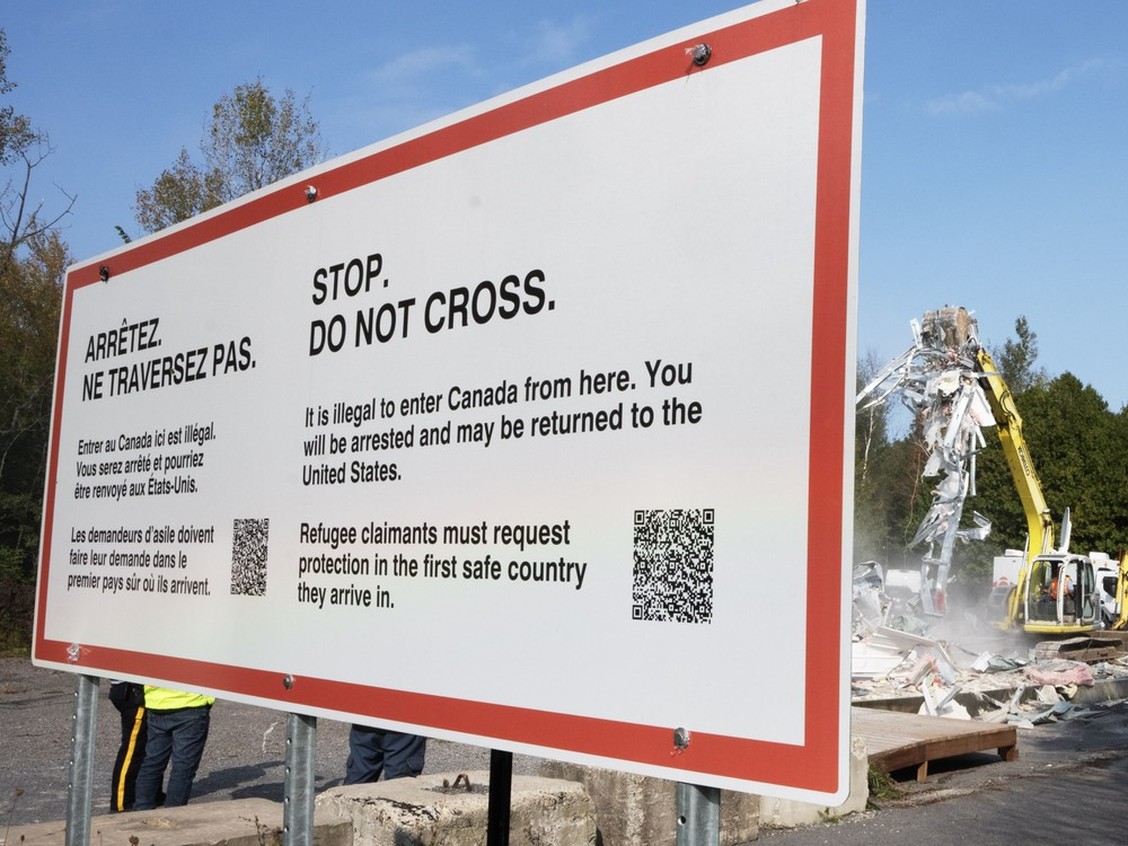Contemplating A Flood Tide of Migrants From the United States Into Canada
"I understand Trump is already talking about building -- basically concentration camps and huge detention centres. And people are just going to run. They're just going to run. They come to either Mexico or Canada.""[Ten thousand illegals showing up at our borders] would throw our system completely off kilter.""So this immigration minister is saying not everybody's welcome but you know we've clearly got a reputation as being soft, and different than the United States. We have a reputation for being very generous. Very, very generous, and that's going to be a problem.""I mean, some of them have come all the way from Africa from Central America, walked into the States, all the way to Canada."Richard Huntley, retired senior Canadian Border Services Agency official
 |
| A family crosses a wooded area at Canada-U.S. border, as recorded on Oliver's security camera. (Submitted by Chris Oliver) |
As
the United States, Canada's neighbour, anticipates the resumption of
Donald Trump's presidency in the New Year, illegal migrants have been
placed on notice that they will be the subject of a new executive order
of mass deportation. The expectation is that millions of illegal
immigrants will be ordered deported. As re-elected president, Mr. Trump
will get on with the preoccupation of his first term; completion of a
border wall between Mexico and the U.S. and cleansing America of
millions of illegals.
Canada
is trembling at the prospect of a hugely enlarged resurgence of people
fleeing deportation, and arriving in Canada to declare refugee status.
Richard Huntley, 68, had 33 years at the Canadian Border Service Agency,
enforcing Canadian border security and immigration rules. He spent two
decades as chief of CBSA's inland immigration enforcement in southern
Alberta, so he knows the file intimately as the longest undefended
border in the world.
With
his experience added to the current almost-dysfunctionally overwhelmed
state of the Service, he has little confidence that the joint apparatus
of the RCMP and the federal border security service even with the
support of Immigration Refugees and Citizenship along with the Canadian
Security Intelligence Service, will find Canada fully prepared for a
deluge of asylum seekers entering from the United States into Canada in a
desperate search for asylum.
 |
CBSA,
he points out, is still trying to cope with the 492 Sri Lankan Tamils
who arrived in 2010 to British Columbia on a Thai cargo ship. The
Liberal government of Justin Trudeau recently scaled back its projected
absorption numbers for immigrants from 500,000 yearly as an intake from
2025 onward. This was a forced decision given the disruption and heavy
calls on an already understaffed and inadequate medical system, as well
as the realization that Canada's housing requirements for additional
population numbers could not be met.
"Coyotes or smugglers, are going to be in big demand. All organized crime knows that there's big money to be made -- even with less chance of being caught than doing drugs or smuggling diamonds or pornography or whatever. There's big money in it and it's very seldom you catch the coyote. Because they're just coming up to the border and pointing the people in the direction of Canada and saying 'That's where you're going'."
The American border patrol is equipped with drones and armed vehicles. In Canada, "we've
got one or two Mounties roaming around every so often, especially out
West here. they're totally ineffective to stop something like this."
There was a time, Mr. Huntley said, when the provinces would hold
immigration detainees while they pursued the refugee process. At the
present time given the numbers of refugee declarants, there just is
nowhere to hold them, and so they're released into the population.
Immigration
detention centres exist only in Vancouver Toronto and Montreal. Refugee
declarants in other cities by their thousands are maintained in
temporary improvised lodgings; social services meant to serve the
Canadian homeless, stretching the capacity of various agencies to their
limits. When people coming in as migrants are not found to be legitimate
refugees Canada has the option of sending them back, obligated to
return them to their country of origin. "Very occasionally, we'd have to charter a plane because somebody would be too dangerous to fly on a commercial flight."
 |
| Human smuggling on the Canada-U.S. border CBC |
"A refugee system where you can't deal with someone's claim in an expeditious manner just leads to problems down the road.""Huge problems, because they become your neighbours, they have kids, they get married, do you know what I mean?""It's impossible to deal with people that have been here for five years or more."Richard Huntley
Labels: Canada Border Services Agency, Claims of Refugee Status, Migrant Expulsion U.S. President Donald Trump

<< Home